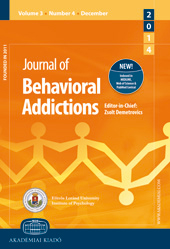Study Addiction: A Cross-Cultural Longitudinal Study Examining Temporal Stability and Predictors of its Changes
Study Addiction: A Cross-Cultural Longitudinal Study Examining Temporal Stability and Predictors of its Changes
Author(s): Paweł Atroszko, Cecilie Schou Andreassen, Mark D. Griffiths, Ståle PallesenSubject(s): Cognitive Psychology, Personality Psychology, Behaviorism, Substance abuse and addiction, Sociology of Culture, Human Resources in Economy, Socio-Economic Research
Published by: Akadémiai Kiadó
Keywords: longitudinal study; personality; study addiction; test–retest reliability; workaholism; work addiction;
Summary/Abstract: “Study addiction” has recently been conceptualized as a behavioral addiction and defined within the framework of work addiction. Using a newly developed measure to assess this construct, the Bergen Study Addiction Scale (BStAS), the present study examined the 1-year stability of study addiction and factors related to changes in this construct over time, and is the first longitudinal investigation of study addiction thus far. Methods: The BStAS and the Ten Item Personality Inventory were administered online together with questions concerning demographics and study-related variables in two waves. In Wave 1, a total of 2,559 students in Norway and 2,177 students in Poland participated. A year later, in Wave 2, 1,133 Norwegians and 794 Polish, who were still students completed the survey. Results: The test–retest reliability coefficients for the BStAS revealed that the scores were relatively stable over time. In Norway, scores on the BStAS were higher in Wave 2 than in Wave 1, whereas in Poland, the reverse pattern was observed. Learning time outside classes at Wave 1 was positively related to escalation of study addiction symptoms over time in both samples. Being female and scoring higher on neuroticism was related to an increase in study addiction in the Norwegian sample only. Conclusions: Study addiction appears to be temporally stable, and the amount of learning time spent outside classes predicts changes in study addiction 1 year later.
Journal: Journal of Behavioral Addictions
- Issue Year: 5/2016
- Issue No: 2
- Page Range: 357-362
- Page Count: 6
- Language: English

